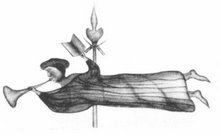Svithey toves outgrabe
.
The great desire of postenlightenment minds seems to be clarity, but sometimes religion does not easily provide that. In reading Jared Diamond's The Third Chimpanzee this week, I came close to "understanding" the divinity-directed genocides in the Old Testament. And, as I think pretending they don't exist is a mistake, surely therefore working to understand them is a virtue? But is something so . . . that . . . possible to fully understand? And if not, is it worth wasting brains on? And if not, then am I a head-in-the-sand religionist?
To be a postenlightenment religionist is to grapple with these question.
So. How shall we grapple?
this svithe in thutopia
last week's svithe


